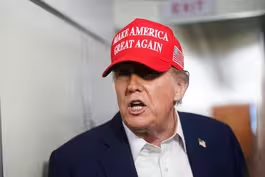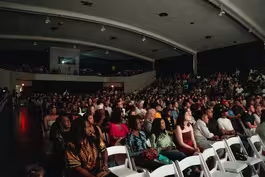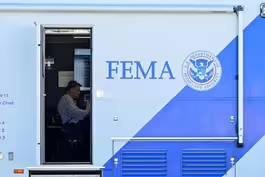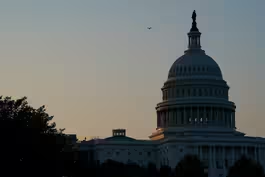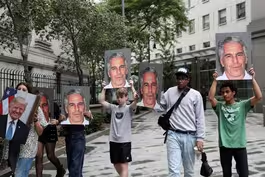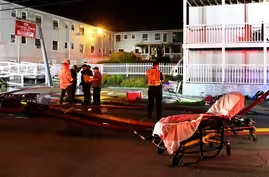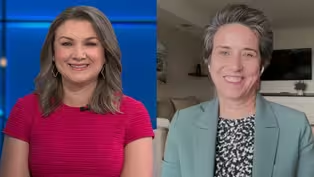
What's behind Trump's shift on arming Ukraine
Clip: 7/14/2025 | 8m 29sVideo has Closed Captions
What's behind Trump's shift on arming Ukraine and his threats against Russia
President Trump and NATO Secretary General Mark Rutte announced they would infuse Ukraine with American weapons bought by European allies. Trump also threatened massive sanctions on Russia if there is no ceasefire by early September. It was a remarkable turnaround for a president who only months ago blamed Ukraine for the war and ridiculed its president. Nick Schifrin reports.
Problems playing video? | Closed Captioning Feedback
Problems playing video? | Closed Captioning Feedback
Major corporate funding for the PBS News Hour is provided by BDO, BNSF, Consumer Cellular, American Cruise Lines, and Raymond James. Funding for the PBS NewsHour Weekend is provided by...

What's behind Trump's shift on arming Ukraine
Clip: 7/14/2025 | 8m 29sVideo has Closed Captions
President Trump and NATO Secretary General Mark Rutte announced they would infuse Ukraine with American weapons bought by European allies. Trump also threatened massive sanctions on Russia if there is no ceasefire by early September. It was a remarkable turnaround for a president who only months ago blamed Ukraine for the war and ridiculed its president. Nick Schifrin reports.
Problems playing video? | Closed Captioning Feedback
How to Watch PBS News Hour
PBS News Hour is available to stream on pbs.org and the free PBS App, available on iPhone, Apple TV, Android TV, Android smartphones, Amazon Fire TV, Amazon Fire Tablet, Roku, Samsung Smart TV, and Vizio.
Providing Support for PBS.org
Learn Moreabout PBS online sponsorshipWILLIAM BRANGHAM: Welcome to the "News Hour."
Today in Washington, President Trump and NATO Secretary-General Mark Rutte announced they would give Ukraine new American weapons bought by European allies.
And President Trump threatened massive new sanctions on Russia if there is no cease-fire established by early September.
As Nick Schifrin reports, it was a remarkable turnaround for a president who only months ago blamed Ukraine for the war and ridiculed its president.
NICK SCHIFRIN: As Eastern Ukraine burned after another Russian attack, President Trump embraced Ukraine's and Europe's defense.
DONALD TRUMP, President of the United States: We are going to be sending them weapons, and they're going to be paying for them.
NICK SCHIFRIN: Ukraine has relied on tens of billions of dollars of American weapons, but until today, the Trump administration had not authorized any new shipments.
Now Europe will send its own U.S.-made weapons to Ukraine, including patriot air defense, and then buy new U.S. weapons to backfill their own stocks.
NATO Secretary-General Mark Rutte.
MARK RUTTE, NATO Secretary-General: It will mean that Ukraine can get its hands on really massive numbers of military equipment, both for air defense, but also missiles, ammunition, et cetera, et cetera.
NICK SCHIFRIN: And the president, who earlier this year publicly embarrassed Ukrainian President Volodymyr Zelenskyy... DONALD TRUMP: You don't have the cards.
You're buried there.
Your people are dying.
NICK SCHIFRIN: ... today said his break with Putin was a family affair.
DONALD TRUMP: We thought we had a deal numerous times.
I'd get home, I'd say, first lady, I had the most wonderful talk with Vladimir.
I think we're finished.
And then I will turn on the television, or she will say to me one time, wow, that's strange, because they just bombed a nursing home.
(LAUGHTER) DONALD TRUMP: I said, what?
NICK SCHIFRIN: Tonight, Ukrainian President Volodymyr Zelenskyy prays Trump's shift.
VOLODYMYR ZELENSKYY, Ukrainian President (through translator): I'm grateful to President Trump for his willingness to support the protection of our people's lives.
NICK SCHIFRIN: The U.N. says that, last month, more Ukrainian civilians died than in any month over the last three years and Russia fired 10 times the number of drones than it did one year ago.
DONALD TRUMP: Doing very severe tariffs if we don't have a deal in 50 days, tariffs at about 100 percent.
You would call them secondary tariffs.
NICK SCHIFRIN: Russia sells $3 billion worth of goods to the United States, so tariffs would have relatively little impact.
But a Senate bill would authorize President Trump to impose massive secondary sanctions on the country's buying Russian oil, including India and China.
That could help cripple Russia's economy, bill co-sponsor Senator Lindsey Graham said yesterday on "Face the Nation."
SEN. LINDSEY GRAHAM (R-SC): We're going after the people who keep Putin in business and additional sanctions on Russia itself.
This is truly a sledgehammer available to President Trump to end this war.
NICK SCHIFRIN: And for perspective on the Trump administration's decision to arm Ukraine, we turn to Kurt Volker.
He was U.S. ambassador to NATO during the George W. Bush administration and special representative for Ukraine negotiations during the first Trump administration.
Ambassador Volker, thanks very much.
Welcome back to the "News Hour."
Bottom line, how significant is this deal that President Trump and NATO Secretary-General Mark Rutte announced today in which Europe will provide Ukraine arms from their stockpiles and then pay the United States to backfill those same weapons?
KURT VOLKER, Former U.S. Special Representative for Ukraine: Well, I think it's very significant because it removes an uncertainty that had been plaguing Ukraine and plaguing Europe ever since the beginning of the Trump administration.
No one was really sure if the Trump administration was going to allow American arms and ammunition to continue to flow to Ukraine.
And now this takes away that doubt.
It is not taxpayer-funded by American taxpayers, which is something that Trump has always said that he would not do.
It is instead funded on a paid-for basis.
European allies are going to be buying the American weapons and ammunition and providing them to Ukraine.
And Trump is quite comfortable with that.
So I think this is very significant in terms of the psychology of where this is now in the military effort.
NICK SCHIFRIN: Russia is pounding Ukraine every night with what seems like daily records of drones and missiles.
And Russia has taken over a little bit of Ukrainian territory in the last couple months in Eastern and Northeastern Ukraine, even at great cost in terms of number of casualties on the Russian side.
But, given that, what impact on the battlefield can these weapons actually have?
KURT VOLKER: Well, there's a couple impacts.
First off, more Patriots and more air defense weapons are going to protect Ukrainian civilians, make these Russian nightly attacks less effective.
Second, with longer-range weapons that can go deeper into Russia, they can take out some of the airfields, some of the military facilities, some of the drone factories perhaps that are empowering Russia in this way.
And, third, with artillery shells, they can hold the line better on the front line than they have been able to do in the past few months.
Mostly, what Ukraine has done is use its own homemade drones to prevent substantial Russian advances and inflict heavy losses.
Artillery is going to strengthen the Ukrainian defensive position.
NICK SCHIFRIN: Let's talk about President Trump's words about President Putin today.
You, of course, started as special representative for the first President Trump administration in 2017 and 2018.
President Trump famously sided with President Putin over the intelligence community when it comes to 2016 election meddling.
Even more recently, President Trump has said things like, oh, Zelenskyy started the war, Ukraine started the war.
But, today, President Trump is now saying that Putin feeds him -- quote -- "B.S."
What do you say about the evolution that President Trump has had over President Putin?
KURT VOLKER: I think he was tactically trying to say nice things about Putin in order to be part of an effort of encouraging Putin to come to the table, have a cease-fire, and we could lift sanctions, we could start doing business again with Russia.
That's where Trump wanted to go.
So he was saying nice things that way.
I think he's become convinced that Putin is just blowing him off.
He is dragging out the idea of negotiations, while, meanwhile, ramping up his attacks and killing civilians.
So I think he has changed his rhetoric now, coming to the conclusion that that's the only way he's actually going to put some pressure on Putin.
NICK SCHIFRIN: But why not achieve that clarity, if you will, years ago?
People like you, other people were telling President Trump that, hey, Putin is not a friend.
Putin is no ally of the United States.
Why now, do you think, has President Trump come to this conclusion?
KURT VOLKER: I suppose because he has experienced it personally now.
Every president, not just President Trump, every president has believed that they could do a reset, to quote an Obama phrase, with Putin.
And everyone believed that they could somehow be the special ingredient to get Putin to behave.
I think Trump has now given his best effort at the same thing, realized that Putin is not changing, he's not going to come to terms, he's not going to do a cease-fire.
And so he has now decided that it's time to ramp up the pressure.
NICK SCHIFRIN: And finally, Ambassador Volker, in the short time I have left, President Trump today threatened sanctions on Russia if there is no cease-fire in the next 50 days.
Those come from a bill in Congress right now that's co-sponsored by senators Graham and Blumenthal.
You heard Senator Graham earlier in the story that we had say that, if these sanctions are imposed, that can end the war.
Do you believe that's true?
What's the impact of those sanctions?
KURT VOLKER: I think it contributes to the end of the war.
What this would do is dry up the financial resources that continue to flow into the Kremlin's coffers, which they use to pay for the war effort.
And so cutting off that supply of funds, of payments for oil and gas is critical.
And the secondary sanctions should be enough to dissuade other countries and other actors from being willing to participate in that sanctions-busting effort.
NICK SCHIFRIN: Ambassador Kurt Volker, thank you very much.
KURT VOLKER: Thanks, Nick.
Big Beautiful Bill could accelerate private education shift
Video has Closed Captions
Clip: 7/14/2025 | 7m 15s | How a 'Big Beautiful Bill' provision could accelerate a shift toward private education (7m 15s)
Critics on their favorite and most anticipated summer movies
Video has Closed Captions
Clip: 7/14/2025 | 8m 35s | Film critics reveal their favorite and most anticipated summer movies (8m 35s)
Ex-FEMA head on praise and criticism of Texas flood response
Video has Closed Captions
Clip: 7/14/2025 | 7m 23s | Former FEMA head responds to praise and criticism of federal response to Texas floods (7m 23s)
GOP faces deadline to cut foreign aid, public media funding
Video has Closed Captions
Clip: 7/14/2025 | 5m 8s | Republicans face deadline to claw back funding for foreign aid and public media (5m 8s)
A look at the split in Trump's base over the Epstein files
Video has Closed Captions
Clip: 7/14/2025 | 2m 57s | A look at the split in Trump's base over the Epstein files (2m 57s)
News Wrap: Assisted-living facility fire kills at least 9
Video has Closed Captions
Clip: 7/14/2025 | 5m 14s | News Wrap: Fire at assisted-living facility in Massachusetts kills at least 9 (5m 14s)
Tamara Keith and Amy Walter on fallout of the Epstein case
Video has Closed Captions
Clip: 7/14/2025 | 7m 32s | Tamara Keith and Amy Walter on the political fallout of the Epstein investigation (7m 32s)
Providing Support for PBS.org
Learn Moreabout PBS online sponsorshipSupport for PBS provided by:
Major corporate funding for the PBS News Hour is provided by BDO, BNSF, Consumer Cellular, American Cruise Lines, and Raymond James. Funding for the PBS NewsHour Weekend is provided by...
